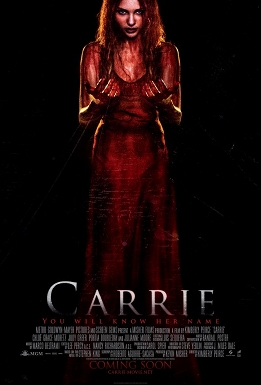For decades, Stephen King has scared audiences with his fresh, unique, and downright horrific stories of psychological madness and supernatural events. Many have made their way from the page to screen, but few have ever been given a second treatment. Kimberly Peirce's Carrie is a prime example why.
Telling the story of a teenager who discovers that she possesses the extraordinary ability to move objects with her mind, Carrie was originally released in 1976 when Sissy Spacek earned an Oscar nomination for her portrayal of the title character. Piper Laurie also earned Oscar recognition for her work as Carrie's over-protective mother whose obsession with religion and pure fear of hell prevents her daughter from fitting in with her classmates. ChloëGrace Moretz and Julianne Moore embody the roles respectively in this update, and neither live up their predecessors.
Expectations were high given both actors' incredible resumes; however, neither are able to fully encompass the depth of their respective roles, leaving much to be desired. Moretz is unable to bring Carrie White to life, handicapped by inadequate dialogue and a rushed, unrealistic development that ends with her being the joke of the prom. Moore is also dealt an unfavorable hand as she is never able to fully express the meaning behind her behavior (most of which would warrant a full film's worth of explanation). Her actions seem abrupt, out of place, and unconventional, leaving much to the imagination as you attempt to piece together the life that Carrie has been forced to endear.
Another miscue lies within the film's R rating, which should have allowed for an intense and gory film. Instead audiences are greeted with a soft, PG-13 caliber film that is merely bookended by short, gruesome sequences. The middle is merely fluff, compiled from 75 minutes of immature, childish gimmicks that, barring one slip up, would be considered tame for the average middle school. The end result is an unrealistic situation that made me constantly question the film's categorization as horror.
All that being said, I do applaud Peirce's homage to the original, especially when it comes to the iconic shower scene. Several creative choices are made during other segments of the film, something required in order to deem the remake necessary (remember 1998's shot-for-shot remake of Psycho?); however, Peirce knew when to alter and when to keep things the same. Sure, her mass overhaul of the ending left me with a strong distaste in my mouth, but she understands the iconic state of the original film and treads the waters delicately as she works to put her own mark on the story.
Fans of the film will likely leave the theater wanting a bit more. Granted, I wasn't itching to look at my watch, nor was I ever bored; however, for those that appreciate the authenticity of the original, Peirce really took a bite too large to safely chew.

